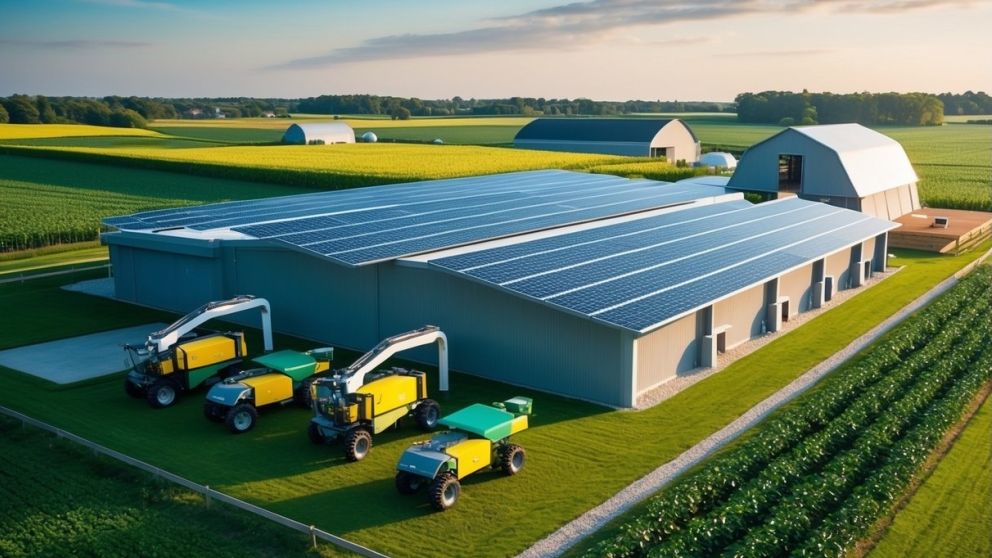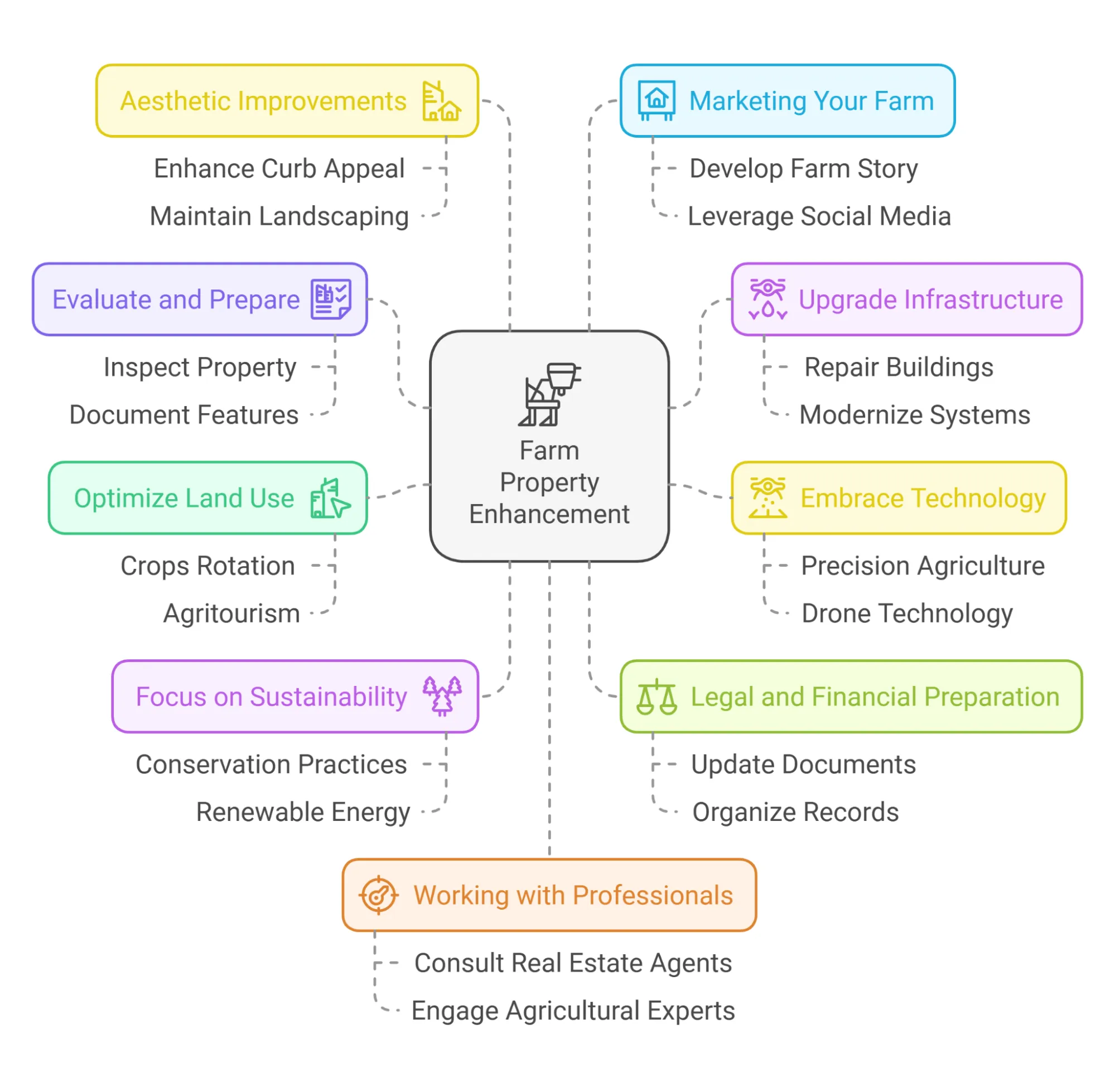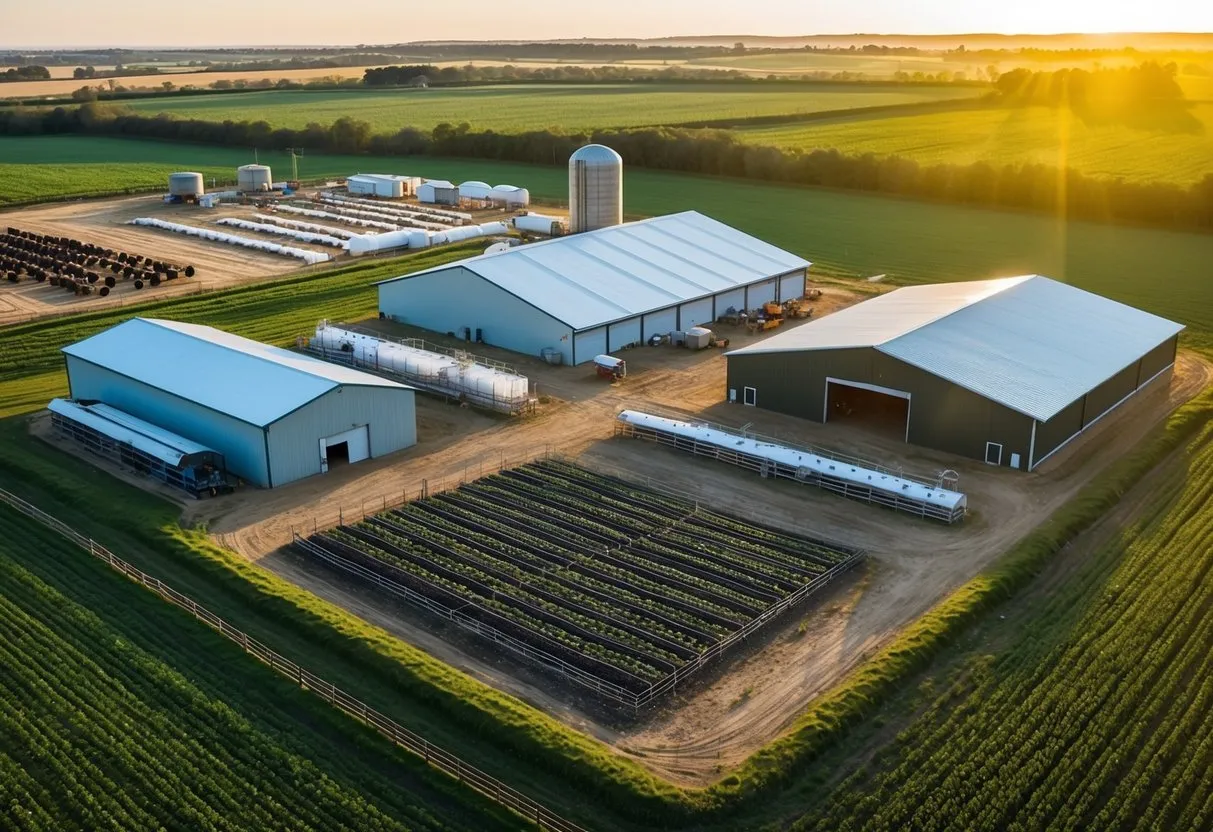2025 Farm Sales Checklist: Preparing Your Property for Maximum Value

Did you know that a well-prepared farm can sell for up to 30% more than a similar property that hasn't been properly maintained?
As we approach 2025, planning ahead for farm sales becomes crucial. Preparing your property for the market can greatly affect its value.
By improving your farm now, you can boost its appeal and potential sale price in the coming year.
[A picturesque farm with well-maintained fields, organized livestock areas, and modern infrastructure, showcasing a thriving agricultural operation]
To get the best price for your farm, you need to look at it from a buyer's point of view. Think about what would make your property stand out.
This might mean fixing up buildings, improving pastures, or adding new features that increase its worth.
Keep an eye on farmland values and market trends. Factors like interest rates and farm income can affect land prices. By staying informed, you can time your sale well and set a fair price for your property.
Key Takeaways
- Prepare your farm early to increase its value for a 2025 sale.
- View your property through a buyer's eyes to identify improvements.
- Stay updated on market trends to price your farm competitively.

Assess Your Farm's Current State
[Aerial view of a well-maintained farm with organized fields, modern equipment, and efficient infrastructure. Livestock grazing in designated areas. Clean and orderly barns and storage facilities]
A detailed evaluation of your farm's present condition is crucial for maximizing its value. This process involves examining your property, analyzing soil quality, and reviewing water systems.
Conduct a Thorough Property Inspection
Start by walking your land and noting its features. Check fences, buildings, and equipment. Look for any needed repairs or improvements. Make a list of all assets, including barns, silos, and machinery.
Take photos of key areas. These will be useful for potential buyers and appraisers. Pay attention to access roads and field conditions. Are there any drainage issues or erosion problems?
Remember to assess your farm's location. Consider its proximity to markets, processing facilities, and transportation routes. These factors can greatly impact its value.

Evaluate Soil Health and Productivity
Soil health is a key factor in farm value. Get professional soil tests done across your fields. These will show nutrient levels, pH, and organic matter content.
Review your crop yield history. Look for trends in productivity over the past few years. High yields can be a strong selling point.
If you haven't already, consider implementing soil health practices. Cover crops, reduced tillage, and crop rotation can improve soil quality and make your farm more attractive to buyers.
Make a note of any unique soil features that could add value. For example, well-drained soils or those suited for specialty crops.
Review Water Resources and Irrigation Systems
Water availability is crucial for farm operations. Check all water sources on your property. This includes wells, ponds, streams, and irrigation systems.
Test water quality and quantity. Make sure you have enough water to support current and potential future operations. Clean, abundant water can significantly boost your farm's value.
Inspect your irrigation equipment. Are your systems modern and efficient? Well-maintained irrigation can be a major selling point. Consider upgrading outdated systems if the budget allows.
Document water rights and any agreements with neighbors. Clearwater access can be a decisive factor for potential buyers.
Partner with Underwood Land Company to maximize your farm's value. Discover expert advice and tailored strategies to prepare your property for a successful 2025 sale. Contact us today!
Upgrade Infrastructure
[A rural farm with modernized buildings, updated equipment, and well-maintained land, showcasing the potential for increased sales value]
Upgrading your farm's infrastructure can boost its value and appeal to potential buyers. These improvements make your property more efficient, modern, and attractive in the competitive farmland market.
Modernize Farm Buildings and Storage Facilities
Assess your current buildings and storage areas. Look for ways to make them more functional and durable. Replace old roofing with metal options that last longer. Insulate barns and sheds to better control temperature.
Consider expanding storage capacity for equipment and harvests. Build climate-controlled areas for sensitive crops or supplies. Install modern ventilation systems in livestock buildings to improve animal health.
Update electrical systems to handle increased power needs. This will prepare your farm for future tech upgrades. Also, remember pest control: seal entry points and use materials that resist rodents and insects.
Improve Fencing and Access Roads
Good fencing and roads are key to a valuable farm property. Replace old, worn fences with sturdy options like high-tensile wire or metal panels. This keeps livestock safe and looks better to buyers.
Widen and grade your access roads. Use gravel or asphalt to make them all-weather-ready. This will help you move equipment and products easily.
Add gates at key points to improve security and traffic flow. Install cattle guards where needed to keep animals in designated areas. Clear brush along fencelines and roads to improve visibility and safety.
Enhance Energy Efficiency with Renewable Solutions
Renewable energy can cut farm costs and attract eco-minded buyers. Start by conducting a farm energy audit to determine where you use the most power. Then, consider installing solar panels on barns or other buildings with large roof areas.
Consider wind turbines if your land has good wind resources. Explore geothermal systems for heating and cooling farm buildings. These can save money long-term.
LED lighting should be used in all buildings to reduce electricity use. To better control energy use, install smart thermostats and timers. If you have crop waste or wood resources on your land, consider biomass heating systems.
Embrace Technology
[A futuristic farm with automated machinery, solar panels, and smart irrigation systems, surrounded by lush green fields and modern barns]
Farm tech upgrades can boost your property's appeal to buyers. Modernizing your operation shows you're forward-thinking and efficient. This can lead to higher offers when it's time to sell.
Implement Precision Agriculture Systems
Precision agriculture technologies are key to maximizing your farm's value. GPS-guided tractors improve planting accuracy and reduce overlap, saving time and resources.
Invest in soil sensors to track moisture and nutrient levels. Buyers will appreciate the data-driven approach to field management.
Drones can help you spot crop issues early. They also create detailed maps of your property. This visual data is valuable for potential buyers.
Consider adding auto-steering systems to your equipment. These systems boost efficiency and can be a selling point.
Adopt Smart Farming Techniques
Smart farming goes beyond equipment. It's about using technology to make better decisions. For example, you can install weather stations on your property to track local conditions closely.
Use farm management software to track your operations. Keep detailed records of planting, harvesting, and yields. Buyers will value this organized approach.
Look into IoT devices for livestock monitoring. These can track animal health and location. This shows a modern approach to animal husbandry.
Explore automated irrigation systems, too. These systems save water and labor costs, and they're especially appealing in areas with water scarcity.
Showcase Data-Driven Farm Management Practices
Your farm data is a valuable asset. Use it to show the property's potential. Create yield maps to highlight productive areas. This helps buyers see the farm's earning potential.
Keep detailed financial records. Use software to track expenses and income. This transparency can speed up the sale process.
Consider getting soil health assessments. Show how your practices have improved soil quality over time. This demonstrates good stewardship.
Use data to create future crop plans. This forward-looking approach can be very attractive, showing buyers the potential for different rotations or new crops.
Enhance Sustainability
Boosting your farm's sustainability can increase its value and appeal to buyers. Green practices show long-term thinking and can lead to cost savings. They also help meet the growing demand for eco-friendly products.
Implement Conservation Practices
Start by improving soil health. Use cover crops to prevent erosion and boost nutrients. Rotate crops to maintain soil balance and reduce pest issues.
Install a water conservation system, such as drip irrigation or rainwater collection tanks. These will save water and reduce costs.
Plant native species and set up nesting boxes to create wildlife habitats on unused land. This will boost biodiversity and attract eco-minded buyers.
Keep detailed records of your conservation efforts. Show potential buyers the positive impact of these practices.
Develop Renewable Energy Sources
Install solar panels on barn roofs or in unused fields. This can slash energy bills and provide a steady income stream.
If your area is suitable, consider installing wind turbines. They're a visible sign of green commitment and can generate significant power.
Look into biogas systems that use farm waste. These systems turn manure into energy, solving waste issues and creating value.
Highlight energy savings in your farm's financial records. Show how green tech improves the bottom line.
Highlight Eco-Friendly Farming Methods
Where possible, adopt organic farming practices and use natural pest controls and fertilizers. This can open up premium markets.
Implement precision agriculture techniques, too. Use GPS-guided equipment to reduce resource waste. Show how this cuts costs and boosts yields.
Try agroforestry methods. Combine crops with trees to better use the land. This can create new income sources and improve soil health.
Get certifications for your eco-friendly methods. Organic, regenerative, or sustainable labels can boost farm value.
Showcase your green methods to potential buyers. Offer tours highlighting sustainable practices in action.
Optimize Land Use
Making the most of your farm's land can boost its value and appeal to buyers. Smart land-use strategies can increase productivity and open new income streams.
Diversify Crop Rotation
Rotating crops helps improve soil health and reduce pest problems. Consider adding high-value crops to your rotation. Legumes like soybeans or peas can fix nitrogen in the soil.
Try planting cover crops between main crop seasons. They protect the soil and add organic matter. This can lead to better yields and lower input costs.
Look into specialty crops that fetch premium prices. Organic produce, heirloom varieties, or local favorites might suit your land.
Consider Value-Added Enterprises
Processing your crops can increase their value. For example, you might dry herbs, make jams, or press your own olive oil. These products often sell for more than raw ingredients.
Think about starting a small-scale livestock operation. Pastured poultry or grass-fed beef can complement your crop fields. They also provide natural fertilizer.
Building a strong farm pedigree through value-added products can make your property more attractive to buyers.
Explore Agritourism Opportunities
Agritourism can bring in extra income and showcase your farm's beauty. You could offer farm tours, hayrides, or pick-your-own fruit experiences.
Host seasonal events like pumpkin patches or corn mazes. These activities draw families and create lasting memories.
Consider setting up a farm stand or small cafe. Selling fresh produce and homemade goods directly to visitors can boost profits.
Diverse land uses make your property more versatile and valuable. Buyers might see potential for their own agritourism plans.
Download our 2025 Farm Sales Checklist today or read on to discover how each step can increase your farm's value by up to 30%.
| Checklist Step | Actions |
Evaluate and Prepare Your Property | - Inspect fences, buildings, and equipment; list repairs. |
| Upgrade Infrastructure | - Repair and upgrade farm buildings; add insulation and expand storage. - Modernize electrical systems for future tech upgrades. - Replace fencing with durable options, such as clear brush along roads and fences. - Improve access roads with weather-resistant materials. - Install renewable energy solutions like solar panels, wind turbines, and LED lighting. |
| Embrace Technology | - Implement precision agriculture systems, including GPS-guided tractors and soil sensors. - Use drones for crop monitoring and mapping. - Adopt smart farming tools like IoT livestock monitors and automated irrigation systems. - Keep detailed data on farm management to showcase efficiency. |
| Optimize Land Use | - Rotate crops to improve soil health and add high-value specialty crops. - Consider value-added enterprises like producing jam, honey, or dried herbs. - Explore agritourism opportunities like farm tours, seasonal events, and farm stands. - Use diverse land strategies to enhance income streams. |
| Focus on Sustainability | - Implement conservation practices like cover cropping, no-till farming, and water-saving systems. - Develop renewable energy resources, such as solar panels or biogas systems. - Highlight eco-friendly methods with certifications (e.g., organic, sustainable). - Create wildlife habitats to boost biodiversity. |
| Legal and Financial Preparation | - Update deeds, titles, zoning permits, and property documents. - Resolve boundary disputes with professional surveys and written agreements. - Organize financial records, including tax returns and income statements for 3-5 years. - Obtain a professional appraisal to accurately price your property. |
| Aesthetic Improvements | - Enhance curb appeal by repairing entry gates, tidying driveways, and planting flowers. - Clean and declutter barns and storage spaces. - Maintain attractive landscaping, including trimmed trees and neat lawns. - Showcase seasonal beauty through thoughtful property staging. |
| Marketing Your Farm | - Develop a compelling farm story highlighting unique features, improvements, and awards. - Invest in high-quality photos and videos, including aerial shots and virtual tours. - Leverage social media platforms and specialized farm sale websites. - Partner with a real estate agent experienced in farm properties. |
| Working with Professionals | - Collaborate with specialized farm real estate agents for market insights. - Consult agricultural experts for property evaluation and improvement suggestions. - Obtain a pre-sale appraisal to support your asking price. |
Legal and Financial Preparation
Organizing your legal and financial affairs is crucial when preparing to sell your farm. This step ensures a smooth transaction and helps you maximize the value of your property.
Update All Property Documents
Make sure all your property documents are up to date and easily accessible. This includes deeds, titles, and zoning permits. Also, check that your property boundaries are clearly defined in these documents.
Review any leases or contracts related to the farm. If you have tenants or agreements with neighboring farms, ensure these are current and transferable.
Farm planning should include updating insurance policies. Verify your coverage is adequate and all premiums are paid.
Resolve Any Boundary Disputes
Address any existing boundary disputes before listing your farm. If necessary, hire a professional surveyor to confirm property lines.
Communicate with neighbors to resolve any ongoing issues. Clear up disagreements about fences, access roads, or water rights.
Document all resolutions in writing. This prevents future conflicts and makes your property more attractive to buyers.
Consider easements or right-of-ways on your land. Ensure these are properly recorded and disclosed to potential buyers.
Prepare Detailed Financial Records
Compile comprehensive financial records for your farm. This includes income statements, balance sheets, and tax returns for the past 3-5 years.
List all farm assets, including equipment, livestock, and crops. Note the condition and value of each item.
Document any improvements made to the property. Highlight investments that have increased the farm's productivity or value.
Prepare a cash flow analysis to show the farm's profitability. This helps buyers understand the potential return on their investment.
Add value to your farm by showcasing its financial health. Consider getting a professional valuation to support your asking price.
Aesthetic Improvements
Making your farm look good is key to getting top dollar. A well-kept property catches buyers' eyes and shows you've cared for the land. Let's look at ways to boost your farm's looks before selling.
Enhance Curb Appeal
Farm curb appeal is your first chance to wow buyers. Start with your entryway. Fix that old fence and paint the gate. A new sign with your farm's name adds a nice touch.
Tidy up the driveway. Fill in any potholes and edge the sides neatly. If trees line the drive, trim them to look neat.
Remember your mailbox. A new one is cheap and makes a good first impression. Plant some flowers around its base for extra charm.
Lastly, make sure your house looks great from the road. Power wash the siding and touch up any peeling paint. Clean windows also make a big difference.
Clean and Declutter Farm Buildings
Your barns and sheds need attention, too. Start by getting rid of junk. Buyers want to see the space, not your old stuff.
Organize what's left. Neat tool racks and tidy storage areas show you're a pro. Sweep floors and clear out cobwebs.
Fix any broken doors or windows. A little repair goes a long way. If needed, consider a fresh coat of paint inside and out.
Don't forget about the smell. Air out musty buildings and use odor neutralizers if needed. A clean-smelling barn is more inviting.
Create Attractive Landscaping Around the Homestead
Good landscaping can really boost your farm's appeal. Start with your lawn. Keep it mowed and edged neatly. Fill in any bare spots with seed or sod.
Plant some colorful flowers near the house. Choose low-maintenance varieties that look good all season. Mulch your flower beds to keep them tidy.
Trim bushes and trees to look neat, and remove any dead branches or overgrown shrubs. A well-kept yard shows that you care about the whole property.
Add some simple touches, like a bench or birdbath. These create cozy spots that help buyers imagine themselves living there. Just don't go overboard—keep it simple and charming.
Marketing Your Farm
Effective marketing can make a big difference when selling your farm. A strong marketing plan helps you reach the right buyers and showcase your property's best features. Let's look at key strategies to market your farm successfully.
Develop a Compelling Farm Story
Your farm has a unique history and character. Share this story to connect with potential buyers. Highlight special features like:
• Historic buildings or landmarks
• Unique crops or livestock
• Sustainable farming practices
• Awards or recognitions
Focus on what makes your farm stand out. For example, you might grow rare heirloom vegetables or use innovative irrigation methods. Preparing your property for sale includes crafting a narrative that resonates with buyers.
Make sure to mention any improvements you've made. New fencing, updated barns, or restored wetlands can add value. Your farm's story should paint a picture of its potential for the next owner.
Prepare High-Quality Photos and Videos
Good visuals are crucial for marketing your farm. Invest in professional photography and videography to showcase your property. Include:
• Aerial shots of fields and boundaries
• Interior and exterior views of all buildings
• Pictures of equipment included in the sale
• Seasonal photos showing the farm's beauty year-round
Create a virtual tour to give buyers a feel for the layout. This is especially helpful for out-of-area buyers. Make sure all images are high-resolution and well-lit.
Capture your farm's best features at the right times. Golden hour lighting can make fields look stunning. Show off blooming orchards in spring or bountiful harvests in fall.
Leverage Social Media and Online Platforms
Use digital platforms to reach a wider audience. Create a dedicated website for your farm sale. Post regular updates on social media channels like:
• Facebook • Instagram • LinkedIn
Share your farm's story and photos on these platforms. Use relevant hashtags to increase visibility. Consider targeted ads to reach potential buyers in specific areas or industries.
List your property on specialized farm and ranch sales websites. These sites attract buyers who are specifically looking for agricultural properties. Provide detailed information about soil types, water rights, and production history.
Partner with a real estate agent who understands farm sales. They can help you create value and market your property effectively to the right audience.
Working with Professionals
Getting expert help can make a big difference when selling your farm. The right professionals will guide you through the process and help you get the best value.
Partner with a Specialized Farm Real Estate Agent
Finding a real estate agent who knows farms is key. Look for someone with experience selling properties like yours. They should know local land values and buyers.
A good farm agent will:
• Market your property to the right audience
• Set a fair price based on current trends
• Handle negotiations with potential buyers
• Guide you through legal paperwork.
Ask other farmers for recommendations. Interview a few agents before choosing. Make sure they understand your goals for the sale.
Consult with Agricultural Experts
Bring in pros who know how to do farming inside and out. They can spot ways to boost your farm's appeal.
Consider talking to:
• Soil scientists
• Crop specialists
• Equipment appraisers
• Tax advisors
These experts can help you showcase your farm's value. They might suggest improvements to make before the sale. Their input can also back up your asking price.
Consider a Pre-Sale Appraisal
Getting an appraisal early on is smart. It gives you a clear picture of your farm's worth.
A farm appraisal looks at
• Land quality and size
• Buildings and equipment
• Crop yields and potential
• Local market conditions.
An accurate value estimate helps you price your farm correctly and gives buyers confidence in the asking price. Choose an appraiser who knows agricultural properties in your area.
Don’t leave your farm’s future to chance. With Underwood Land Company’s expertise, secure top value for your land in 2025. Schedule a consultation now and start planning your success!
Frequently Asked Questions
What factors should be considered when assessing the value of a farm property for sale in 2025?
When assessing your farm's value, you must consider its location, soil quality, and available water resources. The condition of buildings, equipment, and infrastructure also plays a crucial role.
Market trends and local land prices will impact your property's worth. For an accurate valuation, it's wise to seek professional advice.
Can you outline the key elements to include in a farm sales checklist to maximize land value?
Your checklist should include property improvements, financial record organization, and environmental compliance.
Ensure all structures are in good repair and fields are well-maintained.
Document your farm's production history and any unique features. Prepare thorough due diligence materials to instill buyer confidence and streamline the sale process.
What role do real estate farming companies play in preparing farmland for sale?
Real estate farming companies can provide valuable insights into market trends and buyer preferences.
They often have expertise in showcasing agricultural properties effectively.
These companies can help you stage your farm, create professional marketing materials, and reach a wider pool of potential buyers.
What are the most effective real estate farming ideas to enhance property value for sale?
Effective ideas include upgrading irrigation systems, improving soil health, and enhancing farm aesthetics.
Consider adding value through diversification or sustainable practices.
Invest in off-season improvements that boost productivity or reduce operational costs.
These enhancements can make your property more attractive to buyers.
How is the turnover rate in real estate calculated, and why is it important for farm sales?
The turnover rate is calculated by dividing the number of properties sold by the total number of properties in an area over a specific time.
For farm sales, this rate indicates market activity.
A high turnover rate suggests a strong market, which could lead to better prices. Understanding this rate can help you time your sale strategically.
What strategies are recommended for geographic farming to ensure the best real estate outcomes?
Focus on highlighting your farm's unique regional advantages. For example, you can mention climate suitability for specific crops or proximity to markets. Also, leverage local agricultural networks and partnerships.
Showcase how your property fits into the area's agricultural landscape. Emphasize any community connections or cooperative opportunities that could benefit potential buyers.



